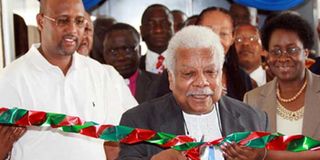Love aside, did we really know this great man?

Prof Ali Mazrui at a past function. He passed away on October 13, 2014 in Binghamton, New York in the United States. FILE |PHOTO
What you need to know:
- I am grateful to have had the opportunity to interact with both Prof Ali Mazrui, who has passed on, and his nephew, Prof Alamin Mazrui, who is still alive.
- Yet I wonder: Did we really know Prof Ali Mazrui? How can we claim we knew him when we misidentify and misrepresent him?
- We may join the world in celebrating his life, but have we read his piercing books and articles on the African condition and the African predicament?
In Prof Ali Mazrui’s home country, where one expects that such a renowned academician would be known by all and sundry, the media has been awash with all sorts of comments about him, some true and some not so true.
A viewer sent a message to NTV Jioni claiming that he remembers Prof Ali Mazrui for writing the play Kilio cha Haki, which the viewer studied as mandatory set book in high school.
That misleading statement resonated with many who had possibly studied the play and now hold tenaciously to the view that the playwright has passed on.
This view has been replicated ignorantly in the social media, mainly Facebook and Twitter, where the late professor has been confused with his nephew — Prof Alamin Mazrui, the actual author of Kilio cha Haki.
And because in social media everyone masquerades as a polymath (a know-it-all) it has been very hard to disabuse a great majority of people of their misconceptions and misapprehensions.
TWO PROFESSORS
It is baffling that countless Kenyans who now lay claim on one of the finest scholars of all time do not even know him well enough or at all.
Prof Ali Mazrui has been mischaracterised as a Swahili scholar and fiction writer when indeed his only fictional work was a novel in English, The Trial of Christopher Okigbo.
The body of his work was largely in the English language, in which he has a mastery that is akin to that of the late Palestinian scholar Edward Said of the Orientalism fame.
Anyone who has read Mazrui’s academic pieces is bound to marvel at his customary elegance and felicity. Anyone who has listened to his presentation would recall the eloquence, the ease, the passion, and the vibrancy with which he delivered them.
I am grateful to have had the opportunity to interact with both Prof Ali Mazrui, who has passed on, and his nephew, Prof Alamin Mazrui, who is still alive.
Yet it bears stating that the confusion regarding who is who between these two eminent scholars is not at all astonishing.
For one, they are both professors with distinguished academic careers.
Prof Alamin Mazrui taught at Kenyatta University, The Ohio State University, USA and now Rutgers, State University of Rutgers, USA.
He is a Kiswahili author, indeed an astute scholar in his own right and my mentor to whom I owe a huge debt of gratitude for my academic journey.
The late Prof Ali Mazrui, my mentor’s mentor, was a political scientist of international repute.
He taught at Makerere University, and several universities in the US, the details of which we need not rehash here. Both belong to the famous Mazrui lineage whose history is inextricably intertwined with the history of the East African coast.
UNDERSTANDABLY CONFUSING
Moreover, whereas the younger Mazrui (below) is known as Alamin Mazrui, the late professor is known as Ali Al’amin Mazrui.
Their identity is thus understandably confusing. One is reminded of the footballing twins in Kenya, Simeon Mulama and Titus Mulama, who would sometimes pose an enigma to those who did know them well enough and could not tell them apart.
Those who knew the two Mulamas would ask the question: “Which Mulama?” A similar scenario applied to the two Kenyan-born scholars.
For some who knew them, the question would always be, “Which Mazrui?”
I met the late Prof Mazrui twice in my life and I knew less of him than his nephew. First when he gave the magisterial talk “From Othello to Obama” at The Ohio State University in 2008 while I was finalising my PhD dissertation.
It was one of the most well-reasoned and compelling talks I have ever had. His witticism, originality and brilliance shone through.
I can recall the conversation I had with him before and after the presentation. I was struck by his humility and compassion.
Two years later, he was in the audience when I gave a Kiswahili presentation of a paper on his nephew’s anthology of poems, Chembe cha Moyo, at the African Studies annual conference at San Francisco, California.
We talked again before and after my presentation and he continued exhibiting the same humility and compassion. Impressed by my presentation, he insisted I should send Alamin a copy of my paper.
Yet I wonder: Did we really know Prof Ali Mazrui? How can we claim we knew him when we misidentify and misrepresent him?
FASCINATED WITH IDEAS
We may join the world in celebrating his life, but have we read his piercing books and articles on the African condition and the African predicament?
I have a feeling that perhaps less than one per cent of Kenyans have ever read his copious academic output, leave alone know him as a person.
That is why they can only claim connection with him via Kilio cha Haki, a book he did not write.
Just how bad is our reading culture? Shall we emulate the late professor’s thirst for knowledge and fascination with ideas and love for reading?
Whatever the case may be, the world now mourns one of the best and brightest minds.
Professor Ali Mazrui had established himself as a brilliant son of the African soil whose academic star shone far and wide and his works will live long after him.




